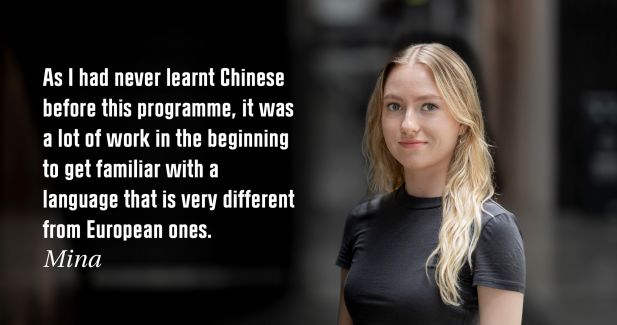BSc in International Business in Asia
About the programme
We all know that Asia is hugely important as the producer of more and more of the world’s goods and services. Asian markets are rapidly growing in both size and importance. We can also read about the increasing global economic, cultural and political influence of Asian countries in general and China in particular. However, from a business perspective Asia is much more than just big markets, high growth rates and economic power. It is about understanding a part of the world that is fundamentally and very quickly rewriting the rules of global competition and business.
Understanding new rules and a different playing field
Companies need international business specialists that understand and can adapt business activities to the very different playing field that applies in an Asian context. The Western approach to trade is no longer dominant – now the East is doing business on its own terms. One example would be how Chinese state intervention and state subsidies shift the competitiveness of industries and companies. Another would be how very large Japanese and Korean business conglomerates create highly complex business environments. Furthermore, Asian firms have technological leadership in areas such as information and communications technology, robotics and artificial intelligence. Yet another example would be how historical and cultural patterns create a very different setting for negotiations, communication and relationships with partners in Korea, India or other countries. Asian business understanding is not an “add-on” to a traditional business education. It is a specialisation in itself.
Managing complexity across borders and cultures
To create Asia business specialists who can successfully navigate this complexity, the IBA focuses on three key areas:
- Firstly, you must understand the special conditions of Asian business, economics and markets.
- Secondly, you must understand the cultural traits and traditions that shape Asian societies and Asian business and management cultures.
- Finally, you must understand business conditions through traditional business courses such as finance, accounting, marketing and organization. You will learn the fundamental concepts of international business and gain insights into topics of international management.
These three key areas are of equal importance. It is the integrated understanding you will gain from working with all three together that will allow you to understand and analyse Asian business challenges, risks and opportunities – and develop and implement relevant solutions.
Importantly, the programme includes a significant language component and you will learn either Mandarin Chinese or Japanese. Understanding one of these languages is an important additional key to gaining a deeper understanding of Asian culture. At the same time, your language skills will allow you to access information and form personal relationships that are important for doing business in Asia and which non-speakers cannot. Of course, Chinese and Japanese are just two of many Asian languages, but the programme focuses on them as they are the principal Asian business languages along with English.
Hands-on experience in Asia
The unique four-year structure of the programme allows students to spend two full semesters in Asia. All students participate in a structured exchange at a university in China or Japan during the fourth semester. In addition, you can spend the seventh semester on individual exchange. This allows you to gain practical intercultural experience while also improving your language proficiency and further developing your international business skills.
Hear students share insights about IBA
Hear students at IBA share some experiences and their thoughts about the programme.
- how companies with business activities in Asia function internally as well as how they interact with the world around them.
- the political, economic and structural challenges companies face when they operate in Asia.
- Asian culture and history – and how they impact on Asian management traditions and business conditions.
- the Chinese or Japanese language
Students at CBS come from all over the world, and all have different backgrounds. Hear students at IBA share their background, and why they chose to apply for the programme.
Challenges and considerations
IBA has some particular challenges that are important to think about before you choose the programme. How well do these challenges correspond to the sort of person you are, how you like to work and the things you are good at?
Chinese or Japanese
Chinese or Japanese are both very demanding languages to learn. For many students this will be the biggest challenge of all – and it requires a lot of self-discipline. You cannot allow yourself periods where you fall behind or it will be very hard work to catch up again.
Different study techniques
At the same time as you face the challenges of learning the Chinese or Japanese language you will also be working with courses in business and related areas. Balancing your time between language and business courses requires structure and the ability to plan ahead.
Different subjects require different ways of studying. You will need to develop different study techniques for working with business and economics courses, cultural and societal courses and language studies. This takes time and you need to be comfortable with that.
Many different courses
The many different courses within many different areas of study mean that it takes time before you fully understand how the different courses and topics relate to one another. Often it is not until the second or third year that everything comes together in your head and you get a clear picture of all the aspects of the programme’s scope. As an IBA student you therefore need to be open to feeling a little confused and not yet seeing the full picture for the first semesters of the programme.
Maths as a tool
In about a third of the mandatory courses in IBA you will use maths as a tool. You will not use maths that is complicated beyond the entry requirement for the programme, but you need to be comfortable having one or two courses each semester where you use maths and do calculations at a practical level.
Studying in English
If you are not used to studying in English or if you are not a native speaker, we recommend that you read more about what to consider before applying for an English-taught programme.
See Studying in English on Student Life
Hear a student guidance councellor share some challenges and considerations you should be aware of before applying to IBA.
The study environment
Hear students share their thoughts about the international environment at CBS and IBA, and how groupwork plays an important role for succeeding.
Career options and Master's programme
- an understanding of the cultural idiosyncrasies of Asian culture and the special challenges of doing business in Asia
- tools and understandings for developing business strategies for working with Asian partners or operating on Asian markets
- Chinese or Japanese language skills
You can find more information about what you learn on the programme in the Competence profile for IBA.
Master's programme after IBA
The clear majority of students from IBA are expected to continue to a two-years master’s programme for a total of five years of study. It is very much the master’s rather than the bachelor programme that determines which career paths that lay open to you. Read more about master’s programmes and career options.
Hear a student guidance counsellor give insights to how you can create your own profile as well as share thoughts on career options and master's programmes.
Entry requirements
| English - language requirement | A |
| English - specific entry requirement | B with min. 6.0 grade average (Danish scale) |
| Mathematics | B |
|
Social Studies level B OR International Economics level B OR History of Ideas level B OR Contemporary History |
B |
| Japanese or Chinese | See specific entry requirements |
| Motivational essay | Yes - see Selection quotas |
Read about entry requirements and how to apply at bachelor admission.
Chinese
|
Grade point average |
7,8 |
|
Number of enrolled students |
41 |
|
Quota 1 / Quota 2 |
60% / 40% |
| Applicants (quota 2) Chinese |
152 (123) |
| Foreign students Chinese |
49% |
| Gender distribution - men / women Chinese |
49 / 51 |
| Average age Chinese |
21,6 year |
Japanese
| Grade point average Japanese |
8,3 |
| Number of enrolled students Japanese |
23 |
| Quota 1 / Quota 2 Japanese |
60% / 40% |
| Applicants (quota 2) Japanese |
116 (93) |
| Foreign students Japanese |
48% |
| Gender distribution - men / women Japanese |
48 / 52 |
| Average age Japanese |
22,1 year |
Overview of courses
The programme is offered by CBS in collaboration with the Department of Cross-Cultural and Regional Studies at the University of Copenhagen, UCPH.
- CBS: Courses within business, economics, organization and research method are offered by Copenhagen Business School
- UCPH: Courses in Chinese language and cultural history are offered by University of Copenhagen
- Depending on the language track, courses take place in Japan, Taiwan or Mainland China.


